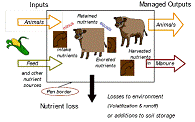Agricultural and Biological Systems Engineering, Department of

Department of Agricultural and Biological Systems Engineering: Presentations and White Papers
Date of this Version
2-2010
Document Type
Article
Citation
Kranz, W. J., D. L. Martin, D. Patterson, J. Hudgins, S. van Donk, and D. Yonts. 2010. Updating the Nebraska Pumping Plant Performance Criteria. Proceedings of the Central Plains Irrigation Conference.
Abstract
Irrigation water is removed from groundwater storage using deep well turbine pumps powered by electric motors or diesel, gasoline, propane, ethanol, or natural gas internal combustion engines. For best operating efficiency irrigation power units are selected to specifically meet the requirements of the irrigation system that include how deep the water in the well is under pumping conditions, the water pressure required at the pump outlet, and the system flow rate. The evaluation of pumping plants to establish pumping plant performance dates back into the 1950’s when researchers at the University of Nebraska were unable to directly compare the operation of an electrically powered pump installation to that powered by a diesel or other internal combustion engine. The solution to this issue was to develop performance criteria for each energy source that would be based upon the amount of work (water horsepower-hours) operators could expect if the system were well-designed and well-maintained. This performance criterion was referred to as the Nebraska Pumping Plant Performance Criteria (NPPPC) that is cited by irrigation design engineers worldwide. A new pumping plant testing program is under way to update the Nebraska Pumping Plant Performance Criteria for all energy types.

